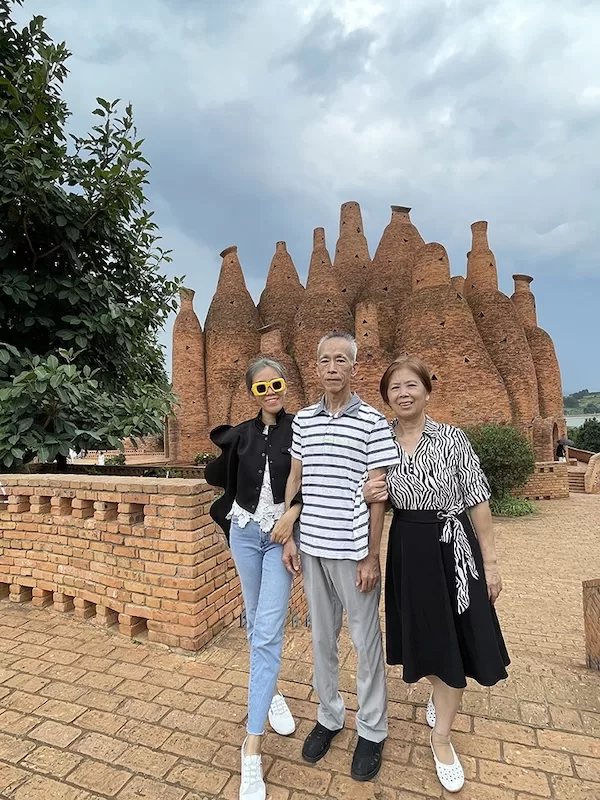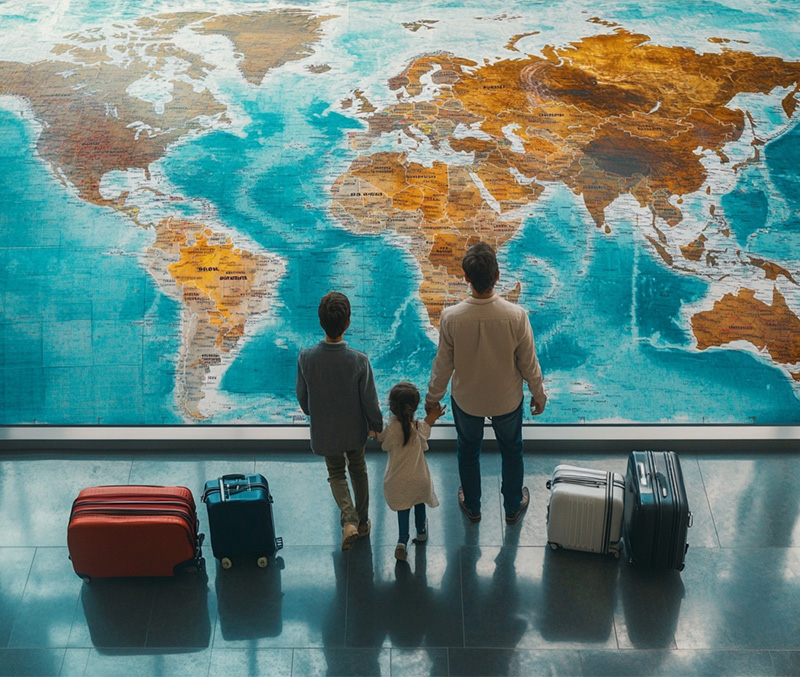I Never Had a Plan B
A Chinese designer’s long, winding journey to success and nomadhood

Raised in a small town in southern China, Stella Guan has always been a fast learner. She picked up the pipa, or Chinese lute, at age 8 and was soon giving solo concerts. She taught herself English as the founder of her middle school’s Harry Potter Fan Club, then taught herself Korean through her obsession with K-drama TV series.
Years later, rather than attending a pricey university, she taught herself graphic design, and did so well in the field that she ended up opening her own school. She also found the strength to withstand the long and sometimes traumatic experience of being a Chinese professional hoping to emigrate to the U.S., gaining her green card a few years ago. Today, at 34, Stella divides her time between the US and China, when she’s not traveling to fascinating new destinations.
Escape Artist: At age 18 you left China and began your studies at Philadelphia’s La Salle University. What were your first impressions was it difficult to find your groove?
Stella Guan: When I landed in Philadelphia, the van from the international student center picked me up at the airport and the driver quickly ran a red light. We got pulled over by the police and apparently our student driver’s license had expired, so we sat there on the side of the road for hours waiting for the van to get towed. Suddenly, we were thrown into the dark and eerie streets and had to figure out how to get a taxi. So my first impression was that American police are aggressive and yet strangely unhelpful and ineffective.
On the other hand, I was amazed by the diversity of the U.S. A handful of other students came to welcome me at the airport and stayed in the van throughout that ordeal. They were all from different ethnic backgrounds—Arab, South American, European. The city of Philadelphia was probably my first experience of culture shock because it showed me the polar opposites of American life. Within days of my arrival I saw extreme wealth right next to extreme poverty.

After graduation you returned to China to work in TV, but soon found it was not the line of work for you. You decided to get into film and started to apply for positions in Los Angeles, when a storm changed your mind. Tell us about that.
I had studied Communications, and TV and film were my passion, so I thought a TV job would be fun. The U.S. market was tough, so I decided to try my luck in China. I applied to an English-language TV channel in Beijing and got the job. But the work environment was brutal, just terribly toxic and tense. My daily commute took three hours, which isn’t unheard of in Beijing, a behemoth of a city, but it meant I had no life outside work. To top it off, the air quality in Beijing was among the worst in the world at the time. It was an unhappy, unhealthy life.
I decided to try my luck in film, and I thought going back to America, the world capital of movies, was the way to go. I put together an application for a cinematography program at UCLA. But then, just as I was about to go mail the package, a storm arrived, with the wind and rain lashing my apartment windows. I decided to wait out the storm, and while I did I was struck by the feeling that I was going down the wrong path again. I tossed out my UCLA application and started applying to a graphic design program in New York.
Design in New York turned out to be the right decision. Even setting aside the toxicity of the film business, there is also the problem of the work visa sponsorship, which is notoriously difficult in that industry. Graphic design presents many more available job opportunities, better work environments, and a greater chance of getting a work visa. And thanks to that simple career change, I achieved all of that, and found work that I enjoy and pays well.

You left China again to move to New York. How did it feel? Was it different from Philadelphia, and did you feel more at home this time?
It actually felt way better the second time around. I was more confident and had so much more knowledge about myself and my new home country. Most importantly, New York became my soulmate of a city. It’s so multicultural, so vibrant, and so beautiful. It felt like home way more than Philadelphia. My NYC honeymoon lasted at least three to four years. I thought I’d never leave because it felt so much like me—loud, passionate, ambitious, fashionable.
My NYC honeymoon lasted at least three to four years. I thought I’d never leave because it felt so much like me—loud, passionate, ambitious, fashionable.
In New York you got into graphic design, but you never earned a design degree. Instead, as you had done with English and Korean, you taught yourself design.
I know many talented people who taught themselves everything. All you need is a decent IQ (you don’t need to be Albert Einstein), a strong drive to learn, and to be resourceful in getting feedback and guidance. I did study design, but not through a formal degree program.
But it turned out to be as impactful as a degree program. Within a few years I was making more than some peers who’d graduated from major programs. This inspired me to start my own school to teach design more effectively than traditional four-year degree programs.

Right, a few years ago you embraced the burden of teaching others to be designers, opening your own design academy, Path Unbound. Tell us how it’s going so far.
In late 2019, I was working a regular 9-5 job and growing anxious about my career. I was relatively well paid, but I had always been a high achiever. I knew I hadn’t moved halfway across the world to live a normal life. I knew I wanted to do something bigger, to have more control, so I decided to start my business. But what type of business?
I thought speaking at conferences would be a good start because I could build my reputation and learn from others. At my very first conference, in Ottawa, Canada, the keynote speaker convinced me to start teaching and I started doing market research. I found gaps in traditional four-year institutions and in private career programs, known as bootcamps.
I thought I could do better, so I started Path Unbound. I cannot say it has been a smooth, easy road since Day One. It’s been a massive learning experience, and I struggled a lot in the early days, with the pricing, the marketing message, the product fit. But now, four years in, I feel confident that Path Unbound is on the path to unbounded success.
A decade after you got into design, you run your own design school, have won a handful of awards and gained international recognition. What has been the secret to your success? Also what sort of design have you specialized in?
I have never had a Plan B. As soon as I know what I want to do, I go all in. I make sure I do everything I can to make it happen, to achieve my objective.
I have never had a Plan B. As soon as I know what I want to do, I go all in. I make sure I do everything I can to make it happen, to achieve my objective. And I never give up. If I fail, I get up and do it again. If I fail again, I get up again, and again. Also, something I learned quite late but am glad I did, is active listening and observing. In my twenties, I think I probably talked too much and could have learned a lot more by listening to smart people, whether in business or life.
In my twenties, I think I probably talked too much and could have learned a lot more by listening to smart people, whether in business or life.
I’m a “Jane of all trades” designer, but I focus on visual design for digital products. I’ve worked on everything from print graphics to website brand and mobile apps. But nowadays, I spend more time solving technical issues, doing sales calls and creating content for my design school.
You received your U.S. green card in mid-2021 after 13 years living in and out of the country. What was the most difficult part of that journey?
The most difficult part was the uncertainty. The U.S. is one of the hardest countries to emigrate to. Many people stay for decades on work visas, yet still have to move back home after they exhaust all of their options without getting a green card. I knew how difficult it was, but I was determined and kept working at it.
And I’m so glad I did! My life would be very different if I’d never gotten my green card. I relate a lot to the American “can-do” attitude, which is my attitude for most things. The other thing is not being able to see family while waiting for your immigration processing. I traveled maybe five times to see family over all those years waiting for my green card. My parents aged a lot in that time and I missed a large part of their lives.

You have written about immigrant guilt and wondered if it would ever go away. Could you explain what you mean by that term, and has it gone away? Do you think it ever will?
Immigrant guilt is the guilt you feel leaving your loved ones behind when you move away to pursue your dream in a faraway land. You will inevitably miss a long period of their lives, and you may miss the chance to say goodbye to some people you love, as I did with my grandmother. But that’s the choice, the trade-off.
Like millions of other immigrants, I chose to pursue my dream. Ultimately it’s a selfish choice, and I have to live with the sacrifices and consequences. The guilt has not gone away and probably never will. But fortunately, now that I have a green card, I can travel to see my family whenever I want. After COVID, I started traveling to see them more and more.
You say that two years ago you accidentally became a digital nomad. How was it accidental? And what convinced you to continue the journey?
I have had consistently bad luck with real estate. First, I bought a house in California in 2020 and lost a lot of money during the pandemic housing craze. Then, I started renting, but things always went south for one reason or another. I had spent so much money moving and settling and moving again, that in 2022, when I started a furniture business, I decided to find a live-work space, which would be good for my furniture brand.
I found a place, but was horrified to discover all kinds of problems once I moved in. One night, the air in the loft got so bad, so toxic that I ran outside grasping for breath. An hour later I grabbed some essentials and checked into a hotel. Sitting there, reflecting on all of my difficulties with renting and owning property, I thought why waste the time, money, and energy? I shut down the furniture business and sold all of my stuff, and that’s how I accidentally became a nomad. Fortunately, my main business is fully remote, so I hit the road and never looked back.

You’ve recently begun advocating for China as a digital nomad destination. Please tell us about China Digital Nomads, the goal of the platform and how it got started.
I was inspired while attending this year’s Bansko Nomad Fest in Bulgaria. There were about 30 digital nomads from Asia and we gathered for dinner one night. I learned that so many of them were organizing events in their own countries, and I thought, why not China?
It’s an ancient civilization with just as much to see and do as our popular neighbors like Thailand, Vietnam, and Japan. So many people hold misconceptions about my country, and I wanted the nomad community to see that China has so much to offer.
I created China Digital Nomads and we’ll host our first retreat in March 2025, a “co-work-ation” focused on cultural exchange and exploration. Besides the gorgeous co-working space, we’ll organize group dinners, karaoke nights, calligraphy classes, night market visits, as well as day trips to breathtaking natural landscapes in Yunnan Province.
Your website says you now live between the U.S. and China. How has being an expat and a global citizen changed your outlook, your career, your life? How different do you think you’d be today if you’d never left to study in the US and had stayed in China?
I’m tempted to say I would probably have settled down a long time ago, gotten married and had a couple of kids. But even if America had never happened, I probably would have been hustling to do something unconventional in China. I have never enjoyed a simple, traditional life.
I have never enjoyed a simple, traditional life. I need variety and adventure in my life, I know that now, and there’s nothing wrong with that.
I need variety and adventure in my life, I know that now, and there’s nothing wrong with that. I am happy now because I’m able to spend a few months here and a few months there. There is no perfect place in this world, but if you don’t mind the logistics of travel and have the financial means, you can sort of create your own perfect destination by combining places you enjoy visiting into your regular travel route.
Please highlight one adventure or experience from the past few years that 18-year-old Stella could never have imagined when she first left home all those years ago.
Early this year I was stuck in Morocco, alone and without any of my belongings due to a visa mishap. I couldn’t re-enter the EU because I had failed to notice that my Schengen visa was single-entry. Without thinking about it, I had left the Schengen region on a weekend trip to Tangier. It was a major crisis that would have freaked out a lot of people.
But after so much travel, I was able to remain calm and work on the problem every day. I was stuck in a country in which I didn’t know any of its languages and was unfamiliar with its culture. But using a combination of calling, emailing, hand gestures, begging, and Google Translate, and with help from the online nomad community, which provided incredibly useful guidance, I was able to get a new visa from the Spanish consulate in one week.
It’s not an irreversible process—you can always go back home if you want. But if you never move abroad, you’ll never know if it’s right for you
Eighteen-year-old Stella might still be stuck in Tangier today—or she would never have traveled there in the first place. The way my life has turned out, 18-year-old me could not have foreseen.
What would you to say people who dream of moving abroad but still live in their home country, whether it’s China or the U.S., because they’re not sure they could live abroad?
The first thing to keep in mind is that it’s not an irreversible process—you can always go back home if you want. But if you never move abroad, you’ll never know if it’s right for you. So rather than wonder on your deathbed what might have been, leave no regrets. Make sure you have your financial situation sorted out, be resourceful, always have a problem-solving mindset, be appreciative of other cultures, and go for it.
——–——–
Stella Guan is the founder and CEO of the online design school Path Unbound and the founder of China Digital Nomads, a co-working retreat in China. Learn more at her website and Instagram.
Stella Guan
































